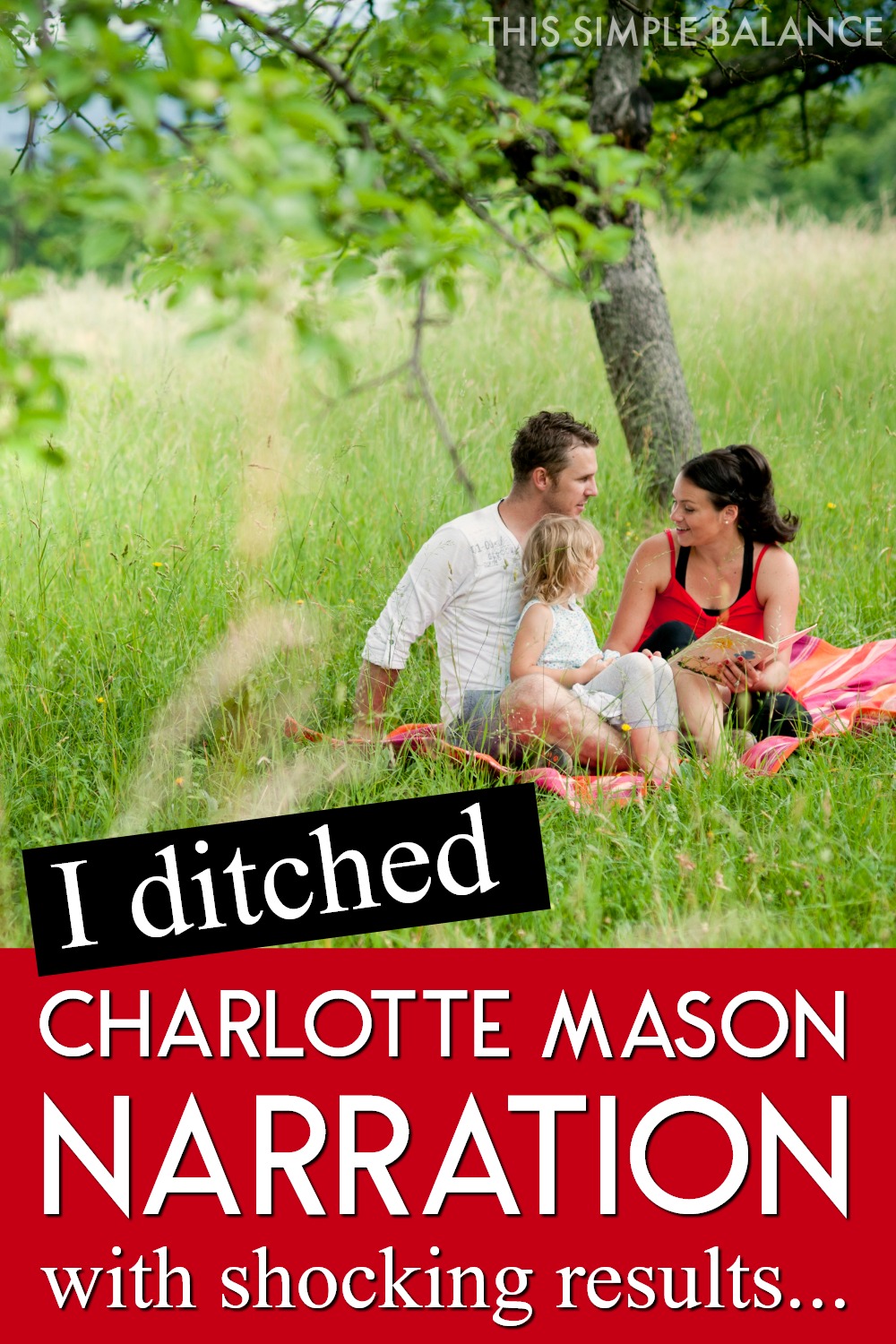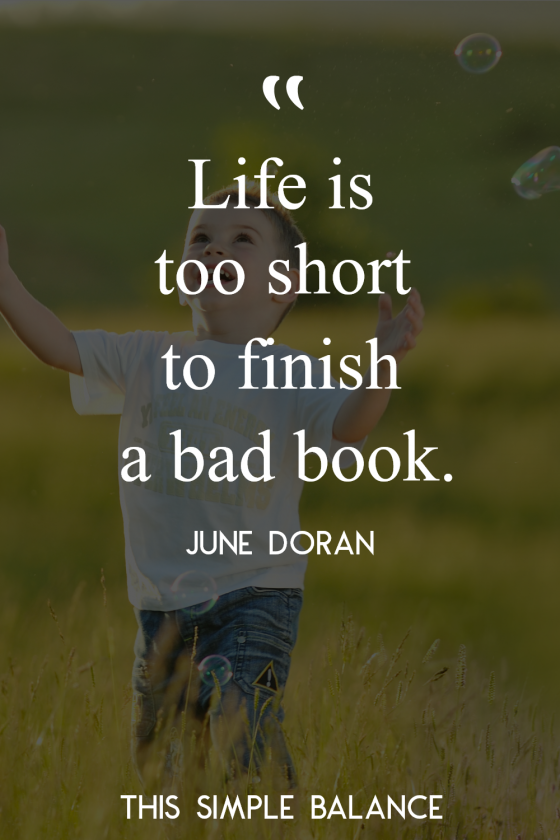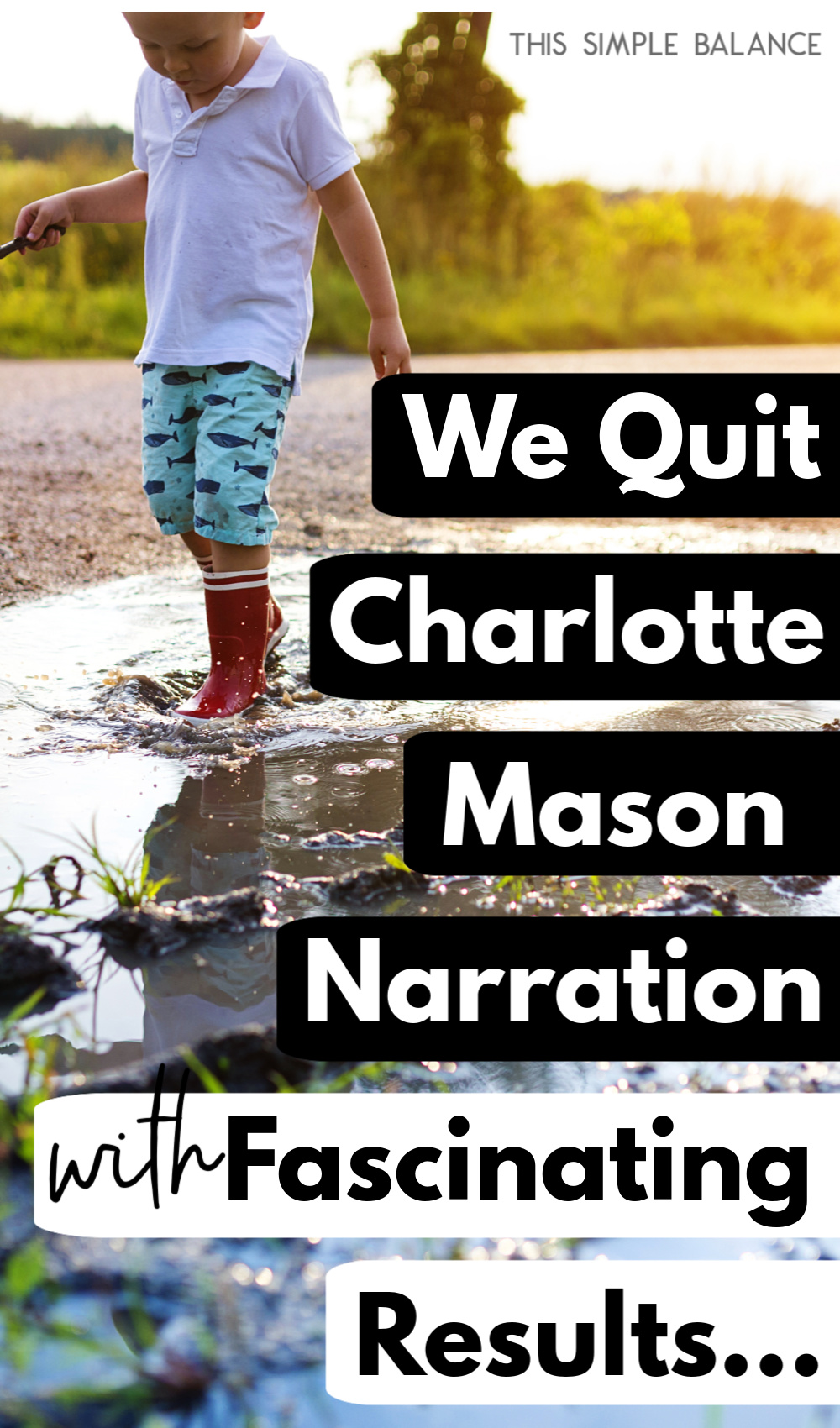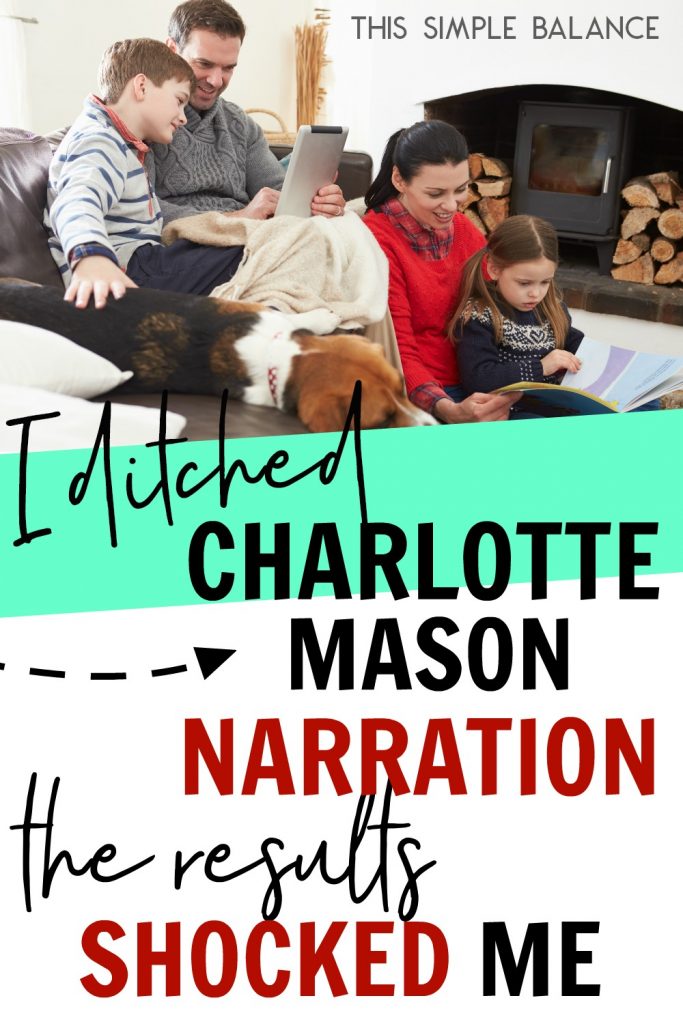Inside: I thought my kids hated Charlotte Mason narration, so I quit using it. Two years later, my kids started narrating spontaneously and without prompting, but this kind of narration was different.
I was introduced to Charlotte Mason narration through the University Model school my daughter attended two days per week our first year homeschooling. During orientation, I listened to the director talk enthusiastically about the beauty of a Charlotte Mason education.
It sounded amazing! Living books, nature walks, character development: it all sounded idealistically lovely.
And it was lovely. In fact, I still love many of Charlotte Mason’s core teachings:
- Learning through literature (not textbooks)
- Being in and observant of nature
- Art appreciation
- Teaching spelling and handwriting using literature
I’m so very far from a Charlotte Mason purist, but most of her teachings just make sense to me as a parent and as an educator. All except one.
Narration.
You Might Also Like: Top 20 Chapter Book Read Alouds According to Homeschool Moms
I Quit Charlotte Mason Narration (with astonishing results!)
THIS POST PROBABLY CONTAINS AFFILIATE LINKS. AS AN AMAZON ASSOCIATE, I EARN FROM QUALIFYING PURCHASES. YOU CAN READ OUR FULL DISCLOSURE POLICY HERE.
If you aren’t familiar with Charlotte Mason narration, it requires children to repeat back in their own words what was read aloud from a living book. I loved the idea of knowing exactly how much my child grasped from what we read and knowing her ability to put those concepts into her own words. I bought into the idea that narration could replace so many other dry and boring methods of assessment.
The only problem? My child hated narration.
By hate, I mean it was the pulling teeth, taking out the garbage, sitting in time out kind of hate. It didn’t matter how short a passage I read, what type of book I read, or how I read it.
She refused to narrate. Period.
I’m pretty sure doing her phonics workbook ranked higher on her list of favorite school activities (and she once looked out a window for 45 minutes to avoid doing phonics).
For the life of me, I couldn’t figure out why it was so repulsive to her. After trying everything I knew to make narration work for us, I finally gave up. I ditched narration altogether and never mentioned it again.
With time, narration faded from memory, and I expected never to think about it again.

The Shocking Results: My Kids Continued Narrating (long after I ditched it)
One morning, more than two years after we stopped doing narration, I had a shocking revelation: my kids were still narrating.
It didn’t look like Charlotte Mason narration because the material being narrated wasn’t something we were reading together. They narrated to me things they were reading and listening to on their own.
The revelation happened when my son came upstairs, totally unprompted, to tell me all about the Wild Kratts episode he had just watched. I knew nothing about the featured animal, so anything he said was new knowledge to me (don’t you just love when they teach you?).
My son, who loves animals and everything Science, summarized the entire episode for me, hitting almost every important fact with animation and excitement. He even tied it all together to older knowledge by comparing that animal with other similar animals.
When he finished and left to play with his siblings, it hit me:
His entire speech sounded remarkably similar to narration as defined on Simply Charlotte Mason.
Considering what you read, pondering how it applies to other ideas you’ve gained, putting it into order, recalling details, mixing it with your opinion, and then forming those thoughts into coherent sentences and telling them to someone else is when real learning takes place” (source).
He did all of the following:
- Considered what he heard/saw
- Thought about how it applies to other ideas he’s already gained
- Put the facts in order
- Recalled details
- Mixed it with his own opinions
- Formed his thoughts into coherent sentences
And this is a child who NEVER EXPERIENCED classic narration.
Later that same week, my oldest started telling me all about her new audiobook. As she chatted with me about the characters, the storyline, the adventures they were currently having, it struck me again: she was narrating.
This is the same girl who HATED narration two years earlier!
Just like her brother, she voluntarily came up to me to tell me all about her latest book.
No teeth pulling, no threatening, no bribing.
So what made the difference? I have a few theories to offer you.
3 Reasons Classic Charlotte Mason Narration Might Not Be Working For You
1. Your kids think narration in classic Charlotte Mason style is dumb (and they may have a point).
Perhaps it was because I considered all of this years after we dropped narration, but I now believe that kids have a very good reason to boycott narration.
To illustrate, I want you to consider this scenario for a minute:
Three adults are sitting together in a room. One adult reads aloud from a favorite novel to the other two adults. When the reader finishes, he closes the book and asks the other adults to retell the chapter back to him.
They probably would look at him a little funny. Didn’t we all just hear the same chapter? Why on earth would you want me to repeat back to you what we just read?
We all heard it…we were together in the same room, listening to the same book: TOGETHER. Seriously, what’s the point?
Yeah, your child is thinking the same thing.
What would be far more natural in adult read-aloud world and adult/child read-aloud world would be to have a conversation about that chapter.
- What did you like?
- What was your favorite part?
- What did you think when this character did that?
- What do you think will happen next?
And that my friends, is a Big, Juicy Conversation, something that happens frequently around our house.
More on what that even means at the end.
2. Your kids would love to narrate about things they get excited about, but after being subjected to classic narration, they might not.
The common theme in my children’s unprompted narration was this: they were both excited about the subject they were narrating about. When kids love a subject, they want to talk about it, sometimes ad nauseum.
More importantly, they want to share it with you, the most important person in their lives. If you didn’t experience whatever it was with them, they want to invite you into it. They do that through narration and/or by inviting you to watch it or read it with them (or both).
3. Your kids might not pay attention long enough to do a good job narrating because they aren’t interested in the subject matter.
What do you, an adult do when you aren’t interested in something you’re listening to?
Your mind starts to wander. You tune it out. You think about other things.
You turn off the radio. You change the channel. You get up and leave.
But how do you act when you are interested in something, particularly if you need the information?
You listen attentively. You hang on the speaker’s every word. Heck, you *might* even take notes.
Now, keep in mind that this point comes from a now borderline unschooler (see this post for my thoughts on unschooling versus relaxed homeschooling). The longer I homeschool, the more things I deem not worth our time to study.
However, there are still a few things I consider vital to my children’s education.
Take history, for example. My boys aren’t that excited about listening to Story of the World these days.
BUT
When I’ve taken the time to pique their interest, lay the groundwork for our reading with my own excitement, and focus on adlibbing to make the text something that truly grabs their attention, guess what? They listen.
However, even with my best efforts, sometimes our current read-aloud doesn’t grab their attention. They still tune out, lose focus, and retain very little information.
When that happens, I ask myself a few questions.
Questions to Ask When Your Kids Aren’t Paying Attention to a Read-Aloud
Am I doing a not so awesome job of reading this book aloud?
Sometimes it’s not the subject matter, it’s the reader.
Your child’s attention might be wandering off because you need to work on the way you are delivering the material.
I’ve been there! Just last night, my daughter suggested I listen to the audiobook version to see how I can improve my voices. Ouch!
With Story of the World and our Bible passages, I often ad lib. I insert or substitute words (to the point where my kids ask, “Is that really what it says, mommy?). I also try to read in an upbeat tone that rises and falls for interest.
If you have a hard time reading aloud, try listening to quality audiobooks. They have helped me figure out how to improve my reading in order to capture my child’s attention.
Are they developmentally ready to listen to this material?
Running a multi-age homeschool is a tricky business. We do as many subjects together as we possibly can (turns out most of our homeschool at this point is technically “morning time” – before I heard about this book, I didn’t even know!).
But I am resigning myself to the fact that I will probably need to read Story of the World another time through with my boys in a few years. They just aren’t there yet, and I want to make sure they really absorb the material.
Am I bored by this? If so, how important is this, really?
This last one is one I forget to ask sometimes. Last month, we brought a stack of books home from the library and dove into one that I thought was going to be good.
Half-way through? The kids’ eyes had that glazed over, “we are so not listening right now” look. I stopped reading, ready to jolt them back to the book.
And that’s when I realized: this book is awful! We didn’t finish it; we moved on to another book that ended up being funny, engaging, and a new favorite.
If you think it’s boring? They probably do, too.
Life is too short to finish bad books.
June Doran

Life after Classic Charlotte Mason Narration
So, what does our homeschool look like now? After dropping classic Charlotte Mason narration, but after adopting our adapted form of narration?
First, I make more time to listen to my kids narrate any educational shows or audiobooks they watched or listened to without me.
After my shocking revelation that my kids were narrating after I ditched narration, I recognized the extremely valuable learning that was happening here, even if it wasn’t classic narration. I am also working on being an active listener, asking them relevant questions to prompt further dialogue about the topic. But when it’s clear they are done narrating and discussing, I let them move on.
Reading aloud is still the core of our relaxed homeschool.
Reading aloud is the one thing that stays constant, even if we haven’t done “school” all week. After reading about this number, however, we don’t stick to strict book lists anymore.
While we no longer do narration after reading aloud, we do have a ton of big, juicy conversations (see! I told you I’d come back to it).
Related: The Number that Completely Changed How I Choose Read-Alouds in Our Homeschool
Big, Juicy Conversations: A Natural Replacement for Classic Narration
Big, juicy conversations is one component of the Brave Writer lifestyle. One of these days, I’ll get around to writing a full post about how I came to find Brave Writer, and why I love it so much.
Until then, what you need to know is that reading aloud should naturally inspire big, juicy conversations (and not just reading aloud, but watching movies together, sharing experiences together, etc.).
The heart of big, juicy conversations is the same as any regular old conversation: listen attentively and ask great questions:
- What do you think about that?
- I wasn’t expecting her to do that. What do you think about her choice?
- If you were in her shoes, what would you have done?
So to sum it all up, we invented a new narration and replaced the classic Charlotte Mason narration with big, juicy conversations.
I still love Charlotte Mason, and I’ll thankful for my initial introduction to her teachings. She helped start our homeschool journey off on the right foot, especially with the concept of learning from living books.
If you love Charlotte Mason, too, but are looking for gentler (for lack of a better word) ways to live out her principles in your homeschool, you will probably love Brave Writer.
I like to think of Brave Writer as a down-to-earth, relaxed version of Charlotte Mason homeschooling. If that idea intrigues you, be sure to check out Brave Writer.
What do you think about Charlotte Mason narration? I’d love to hear your thoughts!




I’ve been reading Charlotte Mason for the last couple years preparing for when my oldest would be ready to start homeschooling this year at 6. I think the narration you describe as being “Charlotte Mason” narration is what many people who haven’t fully internalized Charlotte Mason’s philosophy interpret as being the “correct way” to do narration, but it misses several of her other points about attention and spreading a feast so that children love to learn. If you burn the steaks no one will enjoy the meal, just as when you read a book in an unengaging manner, no one will engage with it without great effort. In life we do have to deal with and learn things we’d rather not think about (how to do taxes or wash the dishes for instance) and there may be some necessary subjects that must be learned in order to be prepared for life even if they aren’t the favorites, BUT the mother teacher has a great deal of input into how subjects are presented and it is wise to present the subjects that we are convinced about the value of (and have instilled the necessary passion in ourselves) to be able to spark interest in our children. The narration that you describe your children doing naturally is what I understand Charlotte Mason to have had in mind when she discussed narration in her volumes. Hers is a philosophy of learning, not a system. When you take bits and pieces of her philosophy and attempt to systematize them, they very easily become like that dry, flavorless steak that should be a delight to eat. I’m fighting that myself in my homeschooling which is why I happened onto your blog. You reminded me that I need to avoid the systematic approach and listen to my little person’s needs and meet him where he’s at. That being said, I’ll not be ditching narration because it has value. I’ll just keep playing with it and how I present our readings to find what works best for my little one.
Kids will naturally narrate, not only because they’re interested in what they’re reading/learning but also— and this is key —when they know they will be heard. I’m mama to several and stopping what I’m doing twenty-seven times a day, simply to listen to a recounting of Eragon for the third time by a child who’s discovering it for the first time… it ain’t easy. BUT, if you do not listen when they WANT to talk/narrate, be forewarned, they will not come to you when they NEED to talk. I see my MIL making this mistake because she has no desire whatsoever to listen to her grandkids narrate their favorite books, her completely clueless to the fact that she’s losing them slowly. Her loss, my gain. Stop everything, listen up mamas, it isn’t just a book they’re narrating, they’re learning to trust you with their heart, sharing with you what excites and motivates them.
I’m not one to typically comment on a post, but I HAD TO. Thank you for this. You basically summed up everything I’ve been thinking and wondering about. My kids hate narration. The only “fruit” I’ve seen from it so far is it’s caused them to feel not good enough for not catching every detail. It’s turned our read alouds upside-down. They used to be fun, but now they get nervous when I read to them, knowing I’ll ask them to tell it back. I like that you hit on that the kids may not be excited about the topic and therefore aren’t super tuned in…and if I find it boring, how important is it really? That was so freeing to read! (Example: Burgess Birds…Do we really need to know every detail of every bird or is simply learning to observe, ask, and appreciate enough.) I also like that you hit on the issue of if a book as age appropriate. I’m a fan of a lot of things Charlotte Mason, but this one has been a hard one for me. Thanks for writing this!
hi Kara! Thank you so much for sharing your experience. We’re several years out from Charlotte Mason homeschooling. There is so much beauty in this style! I think at the end of the day, narration feels much like testing to me. With the parent being the tester. Maybe it works for some, but it didn’t for us, especially when reading aloud for our family is more about mutual enjoyment and connection and delightful rabbit trails. I hope your post-narration homeschool experience brings you joy!
Thank you for this post. I guess I needed to hear that it was okay to let narration go. My poor daughter loves books, but as this school year progresses we are reading less. I know it is from narrating, which she hates. She seems to be developing an aversion to books, which is of course the last thing I want. Having a “juicy discussion” would be so much better for both of us. Thank you again. You never know when something you say will help someone else.
You’re welcome, Wanda! Unfortunately, that’s where we were at with it – it was killing a love of reading and learning. I’m sure other families make it work and benefit from it. It just wasn’t for us. I’m so glad writing this helped you to let it go, too. Here’s to a love of reading and learning!
This is very much what we do and it’ so nice to hear I am not the only person who agrees with my kids that narrating something we all read together is a waste of time. Having a conversation about what we each took from it, asking questions, leading to more thoughts, comparisons, questions… that is stretching the mind and thought process and is also so enjoyable! Thank you for sharing!
You’re welcome! Maybe it works for some, but it definitely didn’t work for us.
Ok, so what I’m hearing is that, from the start, you completely missed what narration was supposed to be. It is NOT like reading to someone, then closing the book and asking them to retell what you read. It is not like that; was never like that; was never what Miss Mason intended for it to be.
So your children, quite naturally, picked up on narrating. Good for them, but it’s no surprise. All humans narrate. When we tell something that happened on a show, in a book, at the company picnic, or a conversation we had with our mother, we are narrating. The problem wasn’t Miss Mason.
Hi Jenn! In all of my reading and learning from other homeschool moms who used narration, the method I described in my post was how it was explained to me and taught for me to apply it. If that was the incorrect application of Charlotte Mason’s idea, I guess I came across the wrong resources or the wrong teachers during my homeschool journey.
Before writing this post, I did some research to confirm that I was understanding the method correctly so long ago, and I came across an entire series on the Simply Charlotte Mason Blog that described the way I was trying to apply it. I assumed that this was correct, but once again, blogs are sharing one point of view. I took a blog dedicated entirely to Charlotte Mason to be authoritative on the subject.
It’s always helpful to hear another perspective, though. I welcome it, so thank you for taking the time to comment!
Clearly, Brave Writer is your guys cup of tea! And I’m glad you found what works for you.
But since you asked, I love narration! I just read Karen Glass’s new book, Know and Tell: The Art of Narration, and she observes EXACTLY what you mentioned–ALL CHILDREN NARRATE NATURALLY.
The difference in the natural narration and what I do in my family is probably similar to natural writing a child would do spontaneously and writing along with a prompt. It is not meant to be just a conservation but is actually oral composition, a precursor to written composition. And the thing you dislike about it is what works for me. It teaches my kids the habit of attention, as they have to attend to what they are reading so they can make an oral composition about it.
I like it because–no worksheets, not so much writing for my boys, especially, and it is much harder than you would think and good practice for public speaking and writing, in my opinion. I guess I’ve found what works well for us, right now at least 🙂
I love to hear when things that didn’t work for us work for other homeschool families! Thanks so much for sharing how you do narration and what’s working for you, Jen. And I agree on loving the no worksheets part, although funnily enough, my kids have picked back up workbooks recently. Two of them are loving Brain Quest. Another thing I abandoned for a time, and now, they’re back. Go figure.